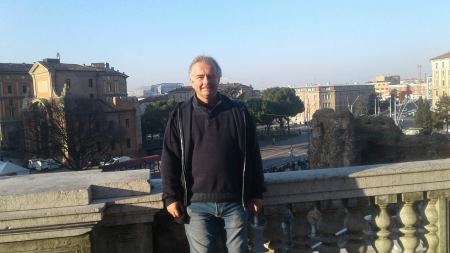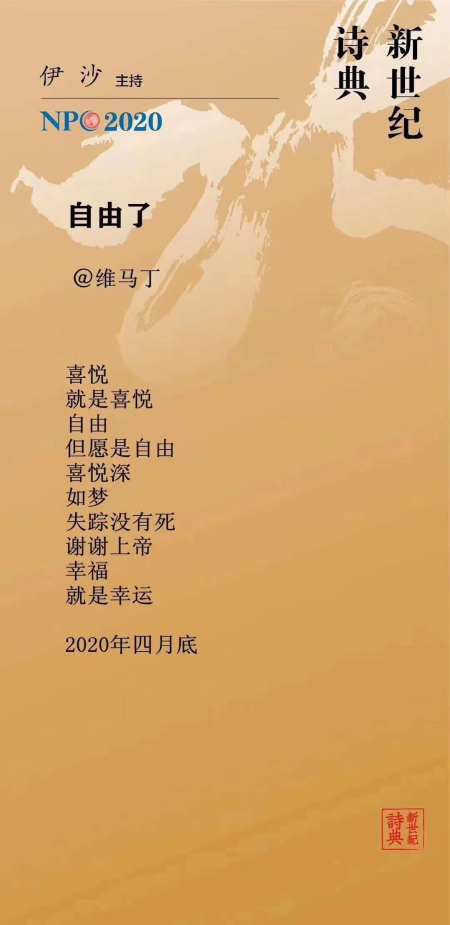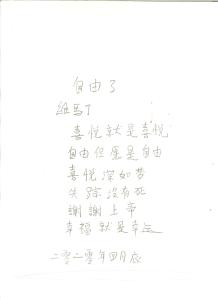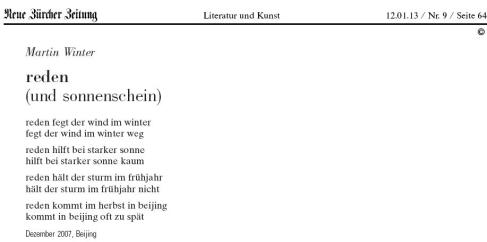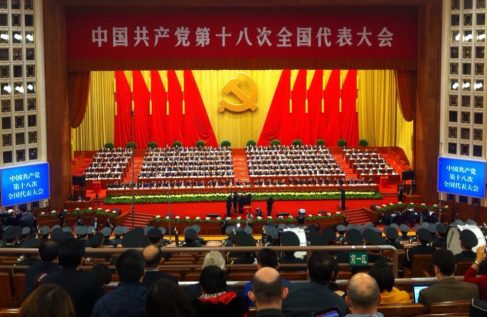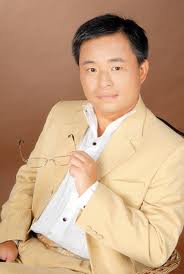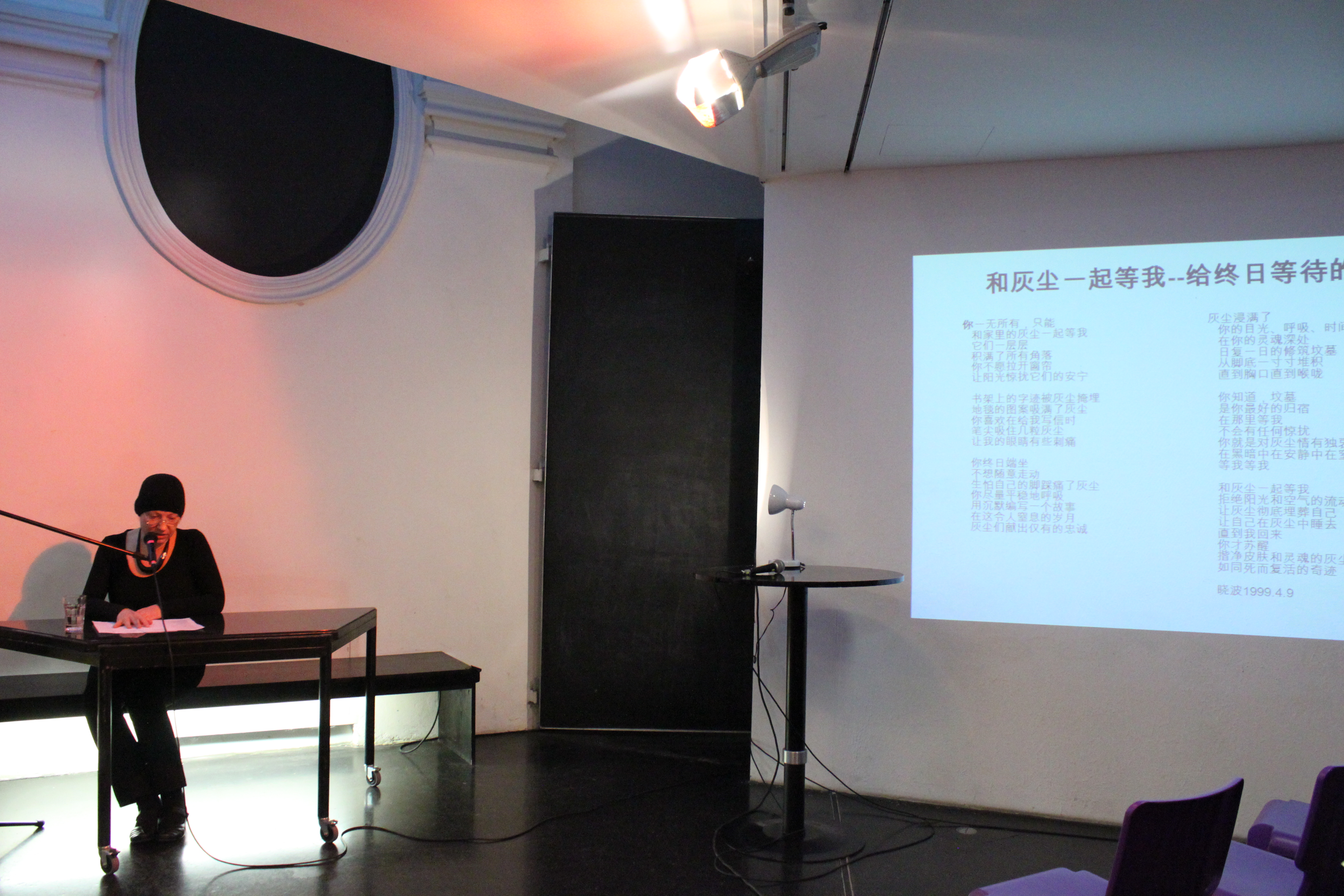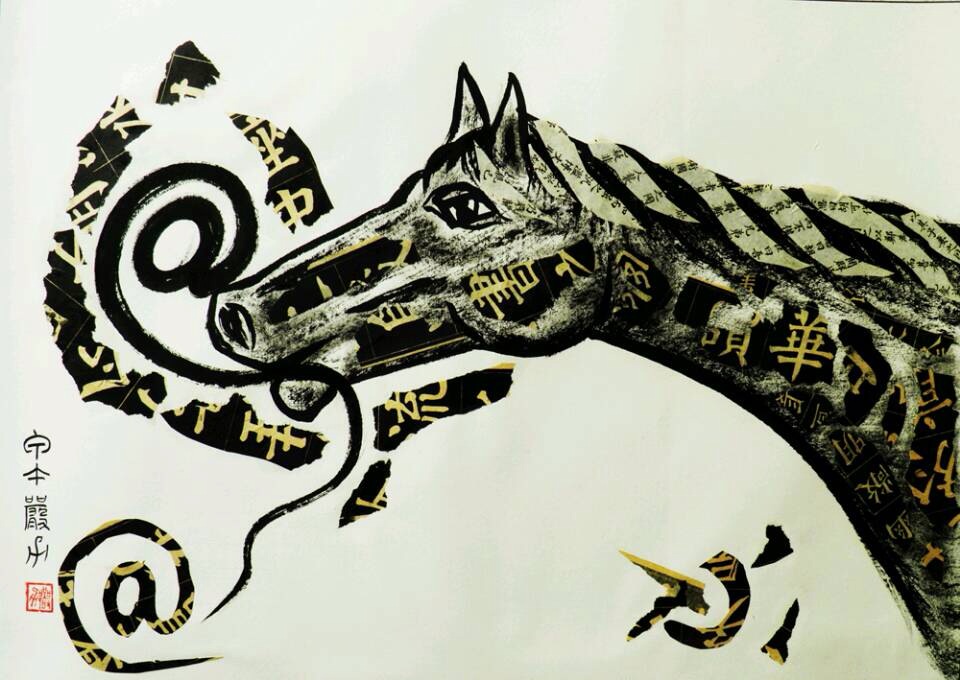
YAN LI! Yesterday I posted his THREE POEMS FROM THE 1980s. Prominent words and themes in GIVE IT BACK (1986), YOU (1987) and YOU (1989) are “love” and “citizen”. The most prominent news story from China in January 2014 was the trial and sentencing of XU ZHIYONG 许志永, a legal scholar and leading activist of the New Citizen movement. Trials, everything connected with rule of law has been very much in the news for a long time in China. See Han Zongbao’s poem 韩宗宝 from fall 2013, for example.
Xu’s statement in court was titled “FOR FREEDOM, JUSTICE AND LOVE“. I was rather surprised at “love” being evoked as a core political value like “freedom” and “justice”. Liberté, Egalité, Amour? Xu’s statement and the accompanying account of how authorities had tried to warn and intimidate him before he was arrested make it clear that he is not only an activist for the rights of migrant workers and for greater openness about public servants’ financial assets. “Can you explain what you mean by Socialism?”, he asks. This is certainly a very important question. China is a Socialist country, at least by name, just like Vietnam, North Korea and Laos. Are there any others? Socialism for China is like Shiite Islam for Iran. But what does Socialism mean, apart from one-party-rule? I think it’s something to believe in, and to practice, to change the fates of working people through actions of solidarity. Isn’t that what the New Citizen movement was trying to do? But Xu has all but dismissed Socialism and has not tried to invoke it as something originally worth believing in. This is understandable, under the circumstances. But can you imagine someone standing up in court in Iran and asking “Can you explain what Islam entails?” Maybe people do it, I don’t know. They probably wouldn’t dismiss religion.
Actually, it is more complicated. I think Xu is testing what is possible. how far the system will go to crush opposition. In his obstinacy he could be compared to Shi Mingde (Shih Ming-te) 施明德 in Taiwan in the 1980s. But Xu is much younger than Shi was in the late 1980s, he was only 15 in 1989.
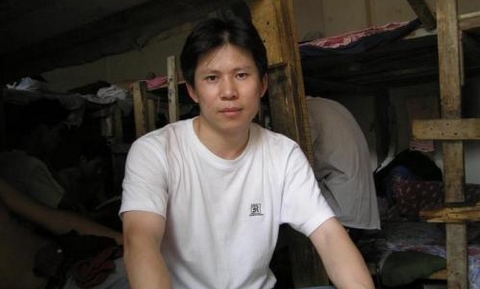
“Me: Aren’t the communist party and socialism western products? May I ask, what is socialism? If a market economy is socialist, why is democracy and the rule of law, which we are pursuing, not socialist? Does socialism necessarily exclude democracy and the rule of law?”
C:你的一系列文章,比如《人民的国家》,整个照搬西方体制,反党反社会主义,你们的组织活动,几个月发展到几千人,你的行为已经构成犯罪,而且不止一个罪名。
我:共产党、社会主义难道不是西方的吗?请问什么是社会主义?市场经济如果是社会主义,我们追求的民主法治为什么就不是社会主义?社会主义必然和民主法治对立吗?关于反党,这个概念太极端,方针政策对的就支持,错误的就反对,而且,我对任何人都心怀善意,如果共产党经过大选继续执政,我支持。[…] 我可能比你更爱中国!你有空可以看看我写的《回到中国去》,看一个中国人在美国的经历和感想。而你们,多少贪官污吏把财产转移到了国外?
C:爱党,爱国,爱人民,三位一体,你不爱党,怎么爱国爱人民?
我:我的祖国五千年了,来自西方的党还不到百年,将来共产党不会千秋万世永远统治,怎么可能三位一体?我爱中国,我爱13亿同胞,但我不爱党。一个原因是历史上它给我的祖国带来的太残酷的伤害,数千万人饿死,文化大革命彻底摧残了中华民族的精神文化,还有就是今天这个党太肮脏,大量贪官污吏,从申请书到入党宣誓都是在公然撒谎——有几个真的要为共产主义奋斗终身?我厌恶谎言,我厌恶为了私欲不择手段,我厌恶一个人在宣誓的时刻也撒谎。
C:敢说不爱党,算你是好汉。考虑到你的主张自由、公义、爱还不错,目的是好的,本着教育的方针,还是希望爱党,放弃公民活动,多和社会各界接触,看问题更客观些。
我:谢谢提醒,我会努力更加客观理性,既看社会问题,也看新闻联播。具体活动如果有不当之处,我可以听取建议,有些行为如果超前了,可以停下来,都可以协商,但是别说什么犯罪。
C:我知道一时半会改变不了你的观点。看过你的档案,你这个人多年来就像一根针一样那么恒定,立场就在那里一动不动。下次接着谈吧。明天后天下午什么时候你觉得合适?
我:明天吧。[words marked by me, see below]
This dialogue between Xu and Beijing State Security official C is very interesting. There is a measure of mutual respect. Xu has spunk, he is brave and obstinate. He mentions “数千万人饿死”, tens of millions died of hunger, as one of the main reasons for not “loving the party” 爱党, as suggested by his interrogator. This dialogue should be very good material for studying Chinese. This section is from the end of the first day (June 25) of Xu’s interrogations in June 2013. You can compare the original to the translation on http://Chinachange.org. In the translation, I could not access the link to Xu’s patriotic article Go Back To China 《回到中国去》, written in New York a few years ago, but it seems to be available on several blogs readily accessible in China.
‘I Don’t Want You to Give Up’ – a public letter by Xu Zhiyong’s wife.
Words like “citizen” and “love”, and any other words or means of expressions, actually, become something remarkably different in a work of art, different from every-day-usage, and usage in political statements. I find Xu’s use of “love” baffling. “Love” strikes me as rather imprecise, compared to “justice”, for example. Love, simply love, not compassion or caritas. Not bo’ai 博爱, just aì 愛, as in Wo ai ni 我愛你。Imprecise, but endearing, as something obviously non-political. And thus closer to poetry, literature, art? Ubi caritas et amor, deus ibi est. All You Need is Love. And so on.
“If I had a hammer I’d hammer in the morning/ I’d hammer in the evening all over this land/ I’d hammer out danger, I’d hammer out warning/ I’d hammer out love between my brothers and my sisters/ All over this land …” Pete Seeger (May 3, 1919 – January 27, 2014)
The International Federation of Journalists has issued a report on press freedom in China in 2013. Here are two small excerpts:
“On May 3, a woman named Yuan Liya was found dead
outside Jingwen shopping centre in Beijing. Police said
Yuan had jumped from the shopping centre, but her
parents suspected she was killed after she was raped
by several security guards during the night. On May
8 the media was instructed to republish a statement
issued by the Beijing Police and further ordered that
no information could be gathered from independent
sources. All online news sites were told to downplay the
case and social microblogs were required to remove all
related news items.”
This immediately reminds me of SHENG XUE’s 盛雪 poem YOUR RED LIPS, A WORDLESS HOLE, from early 2007. The original is titled NI KONGDONG WU SHENG DE YU YAN HONG CHUN 你空洞无声的欲言红唇. The poem was translated into German by Angelika Burgsteiner and recited in early March 2013 at TIME TO SAY NO, the PEN Austria event for International Women’s Day, in cooperation with PEN Brazil.
“On May 14, media outlets disclosed that several
primary school principals were involved in scandals
involving sexual exploitation of minors. All of the alleged
victims were primary school students. Some bloggers
initiated a campaign aimed at protecting children, but
the authorities demanded that the media downplay
both the scandal and the campaign.”
Cf. Lily’s Story 丽丽传 by Zhao Siyun 赵思云, from 2012.
In China, a Young Feminist Battles Sexual Violence Step by Step
